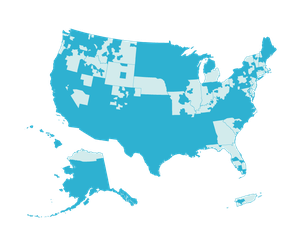In recognition of Small Buiness Week, we're revisiting a vibrant project in rural Astoria, Oregon—a community of 10,000 people in the northwest corner of the state—where a co-op grocery store has adapted to the pandemic and found ways to get healthy, affordable food to residents. A LISC small business loan helped make the difference.
When Astoria Co-Op opened its new and expanded grocery store on the banks of Oregon’s Columbia River last year, its owner-members could not have foreseen what was coming. It was January 2020, and COVID-19 had not yet run rampant throughout the world, affecting the health and economic outlook of families, businesses and whole communities.
In rural Astoria—a community of 10,000 people in the northwest corner of the state—the co-op managed to adapt to changing conditions as the pandemic spread, continuing to find ways to provide healthy, affordable food to residents and even being voted Best Grocery Store by readers of the local Our Coast magazine for the year.
Resilience is certainly nothing new for the nearly 50-year-old co-op. It began life as a small buying club that set up a storefront known as the Community Store in the early 1970s, largely conceived to support a more holistic lifestyle. It has evolved and grown over the years into a full-service member-owned grocer, with a range of healthy, sustainably sourced foods.

It also responds to the broader needs of its community. For instance, in a region with 20 percent of the population living in poverty, the co-op is the only grocery store offering Double-Up Food Bucks, a program that matches a shopper’s Supplemental Nutrition Assistance Program (SNAP) spending on produce with a credit for future produce purchases—a strategy to help make healthy food more affordable. In addition, its Change for Community program raises funding to support local nonprofits, like Oregon Black Pioneers and North Coast Land Conservancy.
For LISC, when we first reviewed Astoria Co-op’s development plans back in 2017, the opportunity to make a meaningful impact was clear, and the reality since has met those high hopes.
The new store has more than tripled the co-op’s space in a location that is adjacent to a food desert, and it revitalized a brownfield site as well. It preserved 30 existing jobs and created another 35 positions—jobs where pay averages nearly $17/hour plus benefits for retail workers, which is well above the local minimum wage. What’s more, as the only natural food store in the region, Astoria Co-op attracts residents and visitors from as far as 40-miles away. It is also the first retailer in the area to implement a renewable energy strategy, completing its rooftop solar installation in March.
“Investing in food enterprises, especially those that connect to economic opportunity and health equity, has long been a priority for LISC,” said Julia Ryan, LISC vice president of health initiatives. According to Julia, LISC has infused an estimated $200 million in grocery stores, food incubators, and other efforts to expand access to healthy food, especially in food deserts and other underserved communities.
The co-op raised more than $1.6 million from its members to support the new store, and LISC supported the effort. The LISC Growing Rural Communities Fund provided $3 million to help finance development of the site, tapping a unique capital structure that blends New Markets Tax Credit equity with loan capital—both, in this case, funded by Northern Trust.
“For Astoria Co-op, we were able to bring together a mix of public and private resources so that we could provide the kind of low-cost, flexible capital that helps a development like this flourish,” said Norman Trepner with LISC’s lending team. “It’s a good example of why community development financial institutions (CDFIs) like LISC are so important. We can invest in ways and in places that conventional lenders might not be able to serve. It’s also worth noting that in addition to playing an integral role in the development of Co-op’s new space, in December 2020 LISC provided a $250,000 working capital line of credit to ensure that Astoria Co-op has additional liquidity to meet operating expenses during what was and continues to be a challenging time for retailers.”
For LISC, Astoria Co-op reflects a number of strategies, including the LISC Rural Promise, which aims to catalyze 20 percent of our community development impact in rural communities, and LISC’s $10 billion commitment to make community investments that help close gaps in health and life expectancy.
“The infrastructure of our communities is physical, social and economic,” added Caitlin Cain, director of Rural LISC. “That means we need to invest in people as much as place in order to drive lasting gains. Astoria Co-op does just that, with a thriving business model rooted in local history, living wage jobs that recognize the value of workers, and healthy food options for a diverse community—all contributing to a stronger local economy.”
For more on Astoria Co-op, visit: https://astoria.coop/
For more on LISC lending products, visit: https://www.lisc.org/our-model/lending/
For more on Rural LISC: https://www.lisc.org/rural/
For more on LISC health initiatives: https://www.lisc.org/our-initiatives/health/
